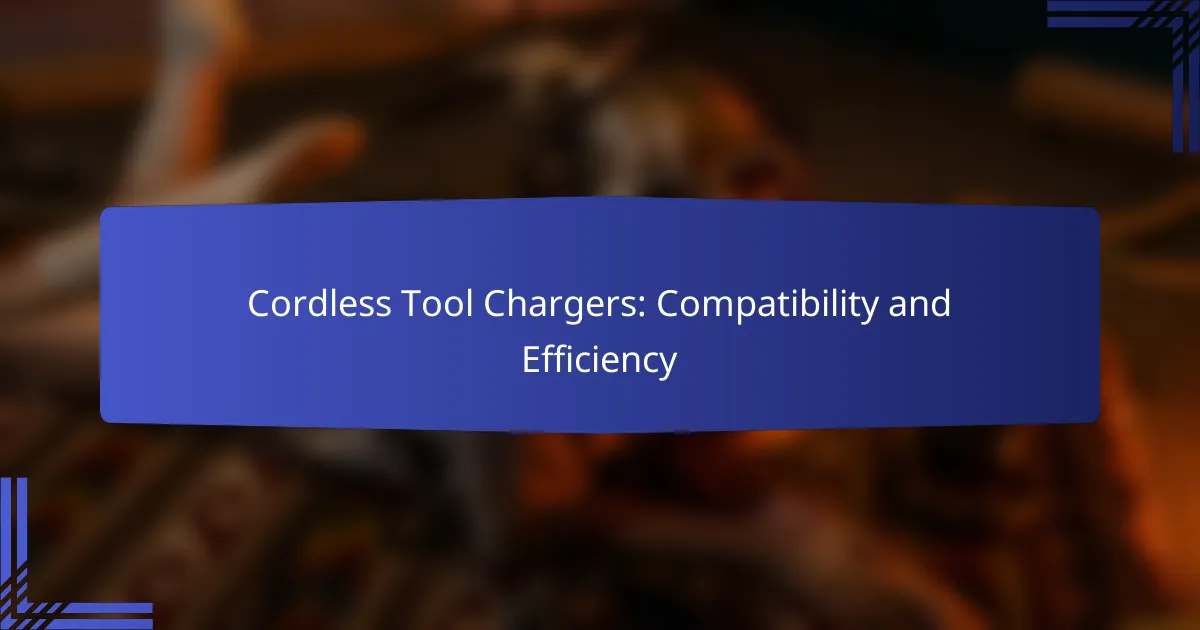When selecting a cordless tool charger, it’s essential to consider compatibility with your specific brand and battery type to ensure optimal performance. Understanding voltage requirements and charging speed can significantly enhance battery life and efficiency. Additionally, higher efficiency ratings in chargers not only reduce energy waste but also contribute to cost savings and a lower environmental impact.
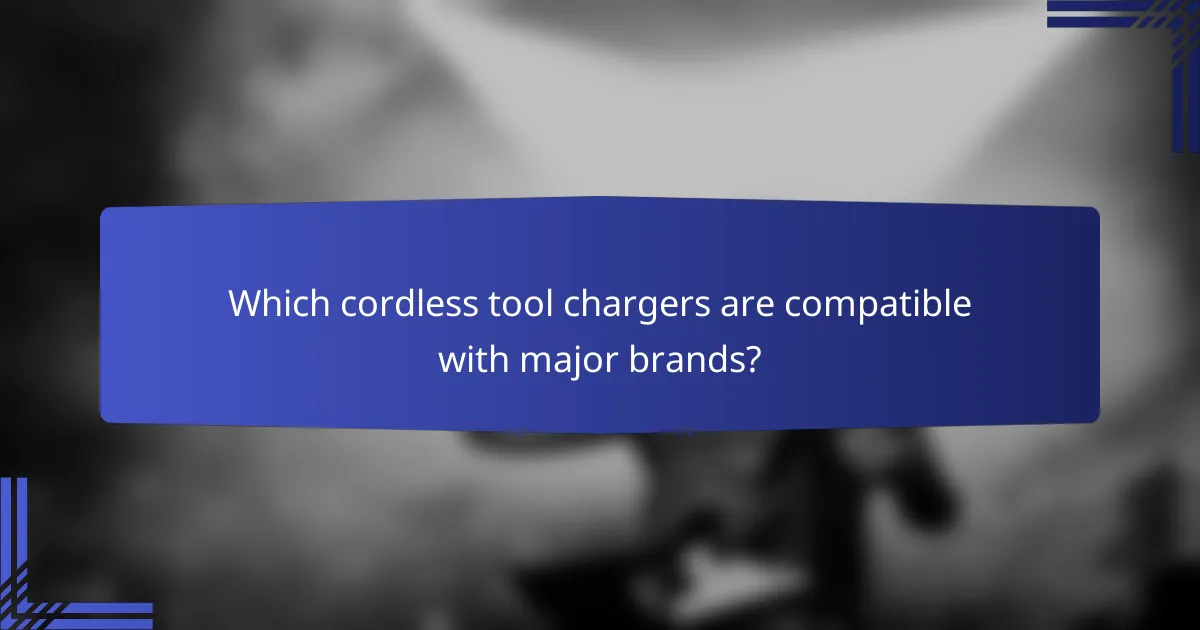
Which cordless tool chargers are compatible with major brands?
Compatibility of cordless tool chargers varies by brand, with each manufacturer typically designing chargers specifically for their batteries. Understanding these compatibilities is crucial for ensuring efficient charging and optimal performance of your tools.
DeWalt charger compatibility
DeWalt chargers are designed to work with their 20V and 60V MAX lithium-ion batteries. Most DeWalt chargers can charge multiple battery sizes, but using the correct charger model is essential for optimal charging speed and battery longevity.
For example, the DCB115 charger is compatible with all DeWalt 20V MAX batteries, while the DCB118 can charge both 20V and 60V batteries. Always check the specifications to ensure compatibility with your specific battery model.
Makita charger compatibility
Makita chargers are tailored for their 18V lithium-ion batteries, with several models available for different charging speeds. The DC18RC is a rapid charger that can fully charge a 3.0Ah battery in about 30 minutes, making it a popular choice among professionals.
It’s important to note that Makita also offers chargers compatible with their 12V and 40V batteries, so ensure you select the right charger for your battery type. Using non-Makita chargers may void warranties or damage batteries.
Milwaukee charger compatibility
Milwaukee offers a range of chargers for their M12 and M18 battery platforms. The M12 charger is designed specifically for 12V batteries, while the M18 charger works with 18V batteries and is capable of charging multiple battery sizes.
For efficient charging, consider the Milwaukee M18 Rapid Charger, which can charge an 18V battery in under an hour. Always verify that the charger matches the battery voltage to avoid issues.
Ryobi charger compatibility
Ryobi’s chargers are compatible with their 18V ONE+ battery system, which is widely used across their tool range. The P117 charger can charge multiple battery sizes within this system, making it a versatile option for users with various Ryobi tools.
Additionally, Ryobi offers fast chargers that can significantly reduce charging time, typically charging a 1.5Ah battery in about 30 minutes. Ensure you use Ryobi chargers to maintain battery health and performance.
Bosch charger compatibility
Bosch chargers are designed for their 18V lithium-ion batteries, with options for both standard and fast charging. The BC330 charger, for instance, can charge a standard 18V battery in approximately 60 minutes.
It’s crucial to use Bosch chargers specifically designed for their battery line, as using third-party chargers may lead to inefficient charging or damage. Always check the compatibility of your charger with the specific Bosch battery model you are using.
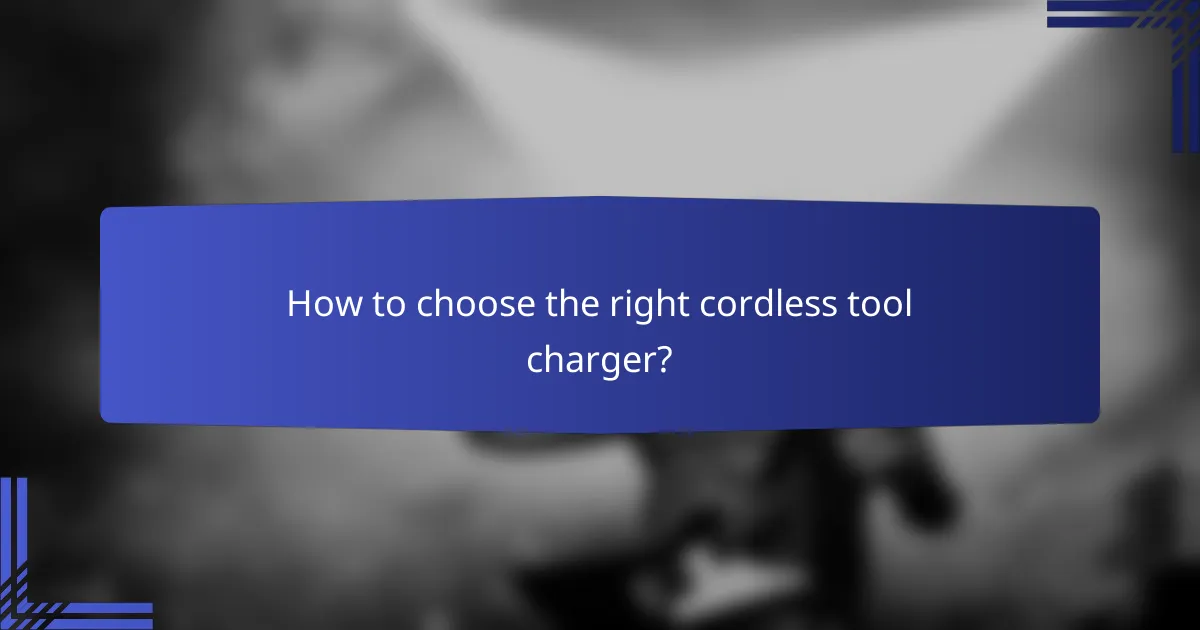
How to choose the right cordless tool charger?
Choosing the right cordless tool charger involves understanding the voltage requirements, battery type compatibility, charging speed, and any brand-specific features. Ensuring these factors align with your tools will enhance performance and battery life.
Voltage requirements
Voltage requirements are crucial for compatibility between the charger and the tool’s battery. Most cordless tools operate on voltages ranging from 12V to 60V, so it’s essential to match the charger voltage with that of the battery. Using a charger with a higher voltage than required can damage the battery.
Check the specifications on both the tool and the charger to ensure they match. If you’re unsure, consult the manufacturer’s guidelines to avoid potential issues.
Battery type compatibility
Battery type compatibility is another key factor when selecting a charger. Common battery types include lithium-ion, nickel-cadmium, and nickel-metal hydride. Each type has different charging requirements and characteristics.
For example, lithium-ion batteries typically charge faster and have a longer lifespan compared to nickel-cadmium batteries. Always verify that the charger is designed for the specific battery type used in your cordless tools to ensure safe and efficient charging.
Charging speed considerations
Charging speed can significantly affect your workflow, especially if you rely on your tools for continuous tasks. Most chargers will specify their charging time, which can range from under an hour for fast chargers to several hours for standard models.
Consider investing in a fast charger if you frequently need to recharge batteries. However, be aware that faster charging can sometimes lead to reduced battery lifespan, so balance speed with battery health.
Brand-specific features
Many brands offer unique features that enhance the performance of their chargers. These may include smart charging technology that adjusts the current based on battery condition, or built-in safety features to prevent overheating.
When selecting a charger, look for brand-specific features that can improve efficiency and safety. Additionally, using a charger from the same brand as your tools often ensures better compatibility and performance.
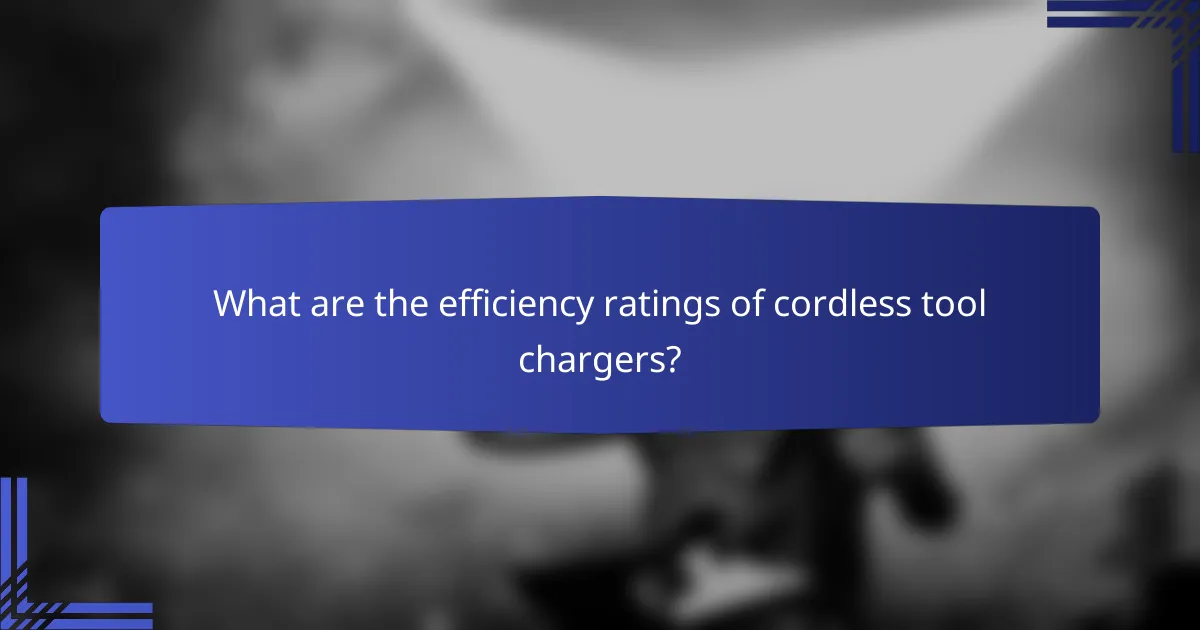
What are the efficiency ratings of cordless tool chargers?
The efficiency ratings of cordless tool chargers indicate how effectively they convert electrical energy from the outlet into usable power for charging batteries. Higher efficiency ratings mean less energy waste, which can lead to cost savings and a reduced environmental impact.
Charging time comparisons
Charging times for cordless tool batteries can vary significantly based on the charger type and battery capacity. For example, a standard charger may take several hours to fully charge a 2.0 Ah battery, while a fast charger can complete the task in under an hour. It’s essential to match the charger with the battery specifications to optimize charging speed.
When comparing chargers, consider the amp rating; higher amps typically result in faster charging. However, ensure that the battery can handle the increased current without risk of damage.
Energy consumption metrics
Energy consumption metrics for cordless tool chargers are crucial for understanding their operational costs. Most chargers consume between 20 to 100 watts during charging, depending on their design and the battery being charged. To estimate energy costs, multiply the wattage by the charging time and your local electricity rate.
For instance, if a charger uses 50 watts and takes 2 hours to charge a battery, it would consume 0.1 kWh (kilowatt-hour), costing a few cents based on average electricity prices. Monitoring these metrics can help identify more efficient charging options.
Heat generation during charging
Heat generation is a common byproduct of charging cordless tool batteries, and it can impact efficiency and battery lifespan. Most chargers are designed to manage heat, but excessive heat can indicate problems such as overcharging or using an incompatible charger.
To minimize heat generation, ensure proper ventilation around the charger and avoid charging in hot environments. Regularly check for signs of overheating, such as battery swelling or unusual smells, which may indicate a need for replacement or service.
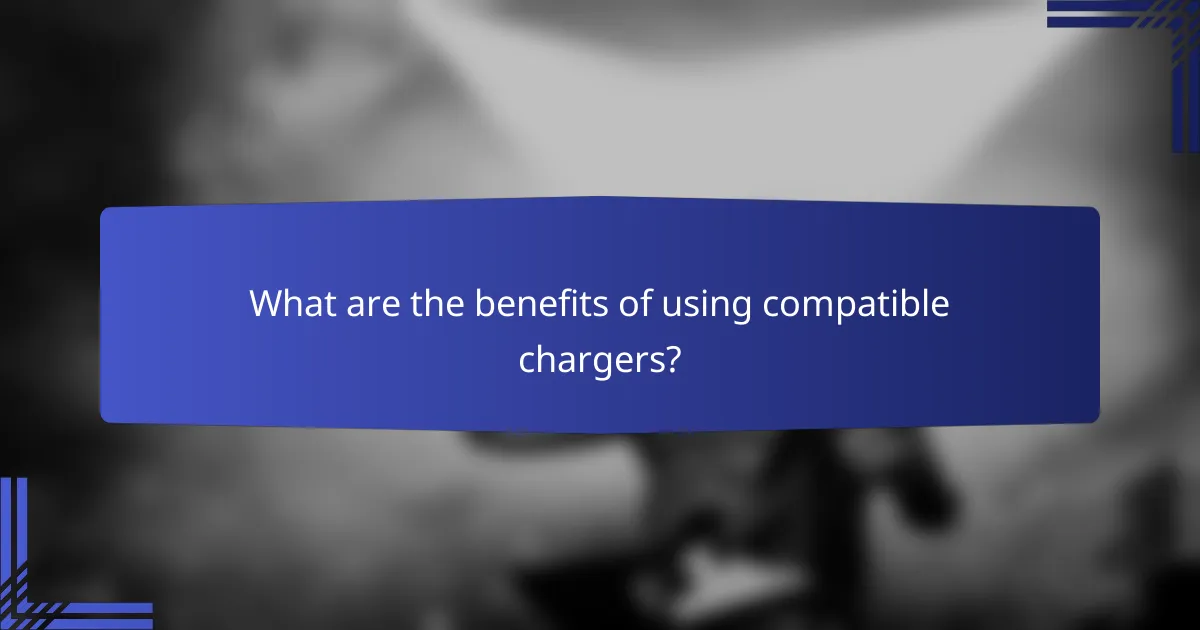
What are the benefits of using compatible chargers?
Using compatible chargers for cordless tools offers several advantages, including enhanced battery performance and safety. These chargers are designed to work specifically with certain battery types, ensuring optimal charging and longevity.
Extended battery lifespan
Compatible chargers help prolong the lifespan of cordless tool batteries by providing the correct voltage and current. This tailored charging reduces the risk of overcharging, which can significantly degrade battery health over time.
For example, using a charger that matches the battery specifications can extend its life by several years, compared to using a generic charger that may not meet the same standards. Always check the manufacturer’s recommendations for the best results.
Improved charging efficiency
Charging efficiency is maximized with compatible chargers, as they are engineered to deliver power in a way that minimizes energy loss. This means batteries can reach full charge faster, allowing for more productive use of tools.
Typically, a compatible charger can reduce charging times by about 20-30%, compared to non-compatible options. This efficiency is crucial for professionals who rely on quick turnaround times during projects.
Reduced risk of damage
Using a compatible charger significantly lowers the risk of damaging both the battery and the tool. Mismatched chargers can lead to overheating or even short-circuiting, which can render tools unusable.
To avoid such issues, always ensure that the charger is specifically designed for your tool’s battery type. Regularly inspect both the charger and battery for any signs of wear or damage to maintain safety and functionality.
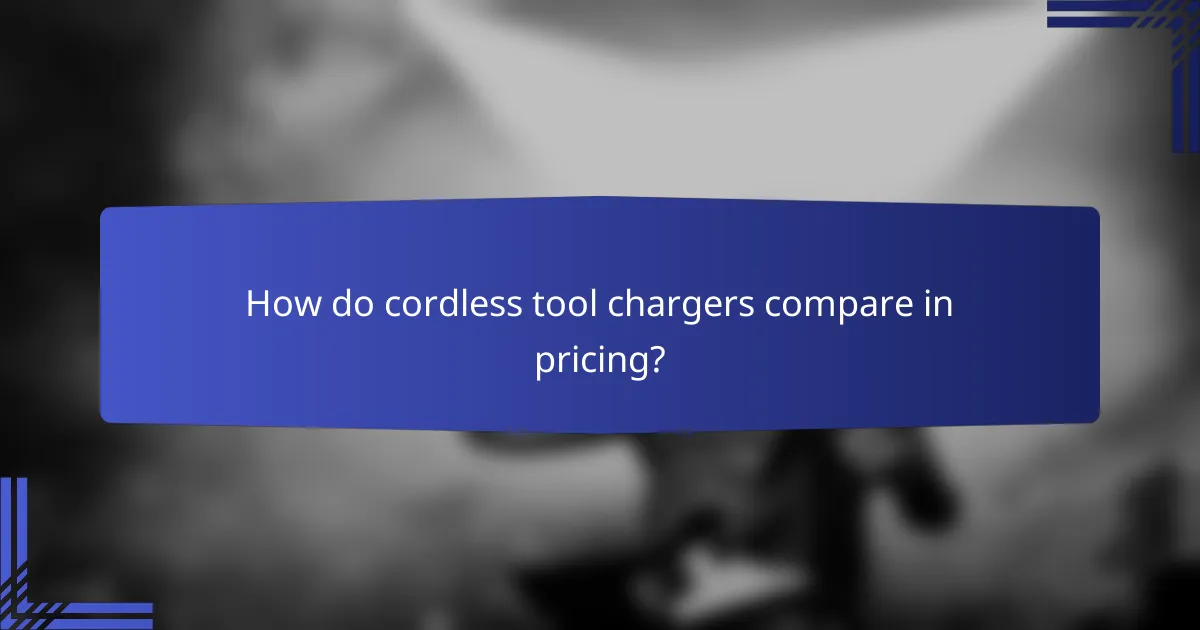
How do cordless tool chargers compare in pricing?
Pricing for cordless tool chargers varies significantly based on features, brand, and compatibility. Generally, you can find options ranging from budget-friendly models to premium chargers that offer advanced functionalities.
Budget-friendly options
Budget-friendly cordless tool chargers typically range from around $20 to $50. These chargers often provide basic functionality and are compatible with entry-level tools. While they may lack advanced features, they are suitable for occasional users or those with simple charging needs.
When choosing a budget charger, ensure it matches the voltage and battery type of your tools to avoid compatibility issues. Look for models that offer a decent warranty to protect your investment.
Mid-range charger pricing
Mid-range chargers usually cost between $50 and $100 and often include features like faster charging times and compatibility with multiple battery types. These chargers are ideal for regular users who require efficiency and reliability without breaking the bank.
Consider chargers that offer smart charging technology, which can extend battery life by preventing overcharging. This feature is particularly beneficial for those who frequently use their tools and want to maximize battery performance.
Premium charger features and costs
Premium cordless tool chargers can range from $100 to $300 or more, depending on the brand and features. These chargers often include advanced functionalities such as multiple charging ports, rapid charging capabilities, and built-in diagnostics to monitor battery health.
Investing in a premium charger is worthwhile for professionals or heavy users who rely on their tools daily. Look for chargers that offer compatibility with a wide range of battery types and brands to ensure versatility in your toolkit.
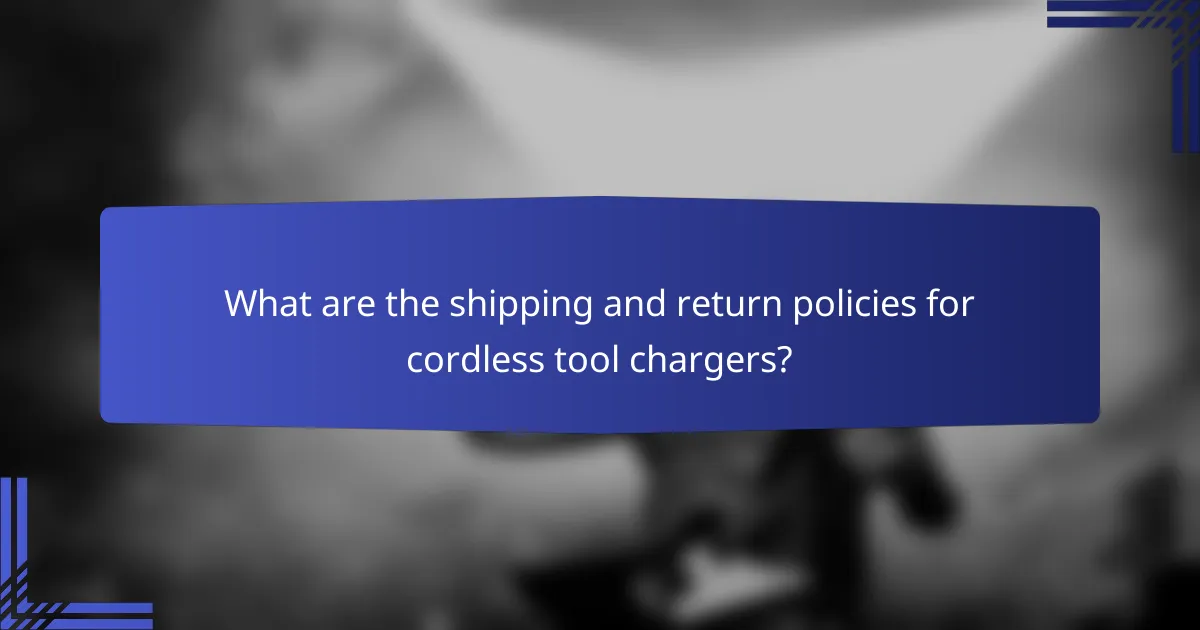
What are the shipping and return policies for cordless tool chargers?
Shipping and return policies for cordless tool chargers vary by retailer but generally include options for standard and expedited shipping, along with specific return windows. Most retailers allow returns within a certain period, often ranging from 30 to 90 days, provided the charger is in its original condition.
Shipping Options
When purchasing cordless tool chargers, you can typically choose between standard shipping, which may take several days, and expedited shipping for faster delivery. Some retailers may offer free shipping on orders over a certain amount, while others may charge a flat rate or variable fees based on location.
Return Policies
Return policies for cordless tool chargers usually require that the product be unused and in its original packaging. Many retailers offer a 30-day return window, but some may extend this period to 90 days, especially during holiday seasons. Always check the specific terms, as some items may be non-returnable due to hygiene or safety regulations.
Exchanges and Refunds
If you need to exchange a cordless tool charger, most retailers will facilitate this process, often allowing you to select a different model or brand. Refunds are typically processed within a few business days after the returned item is received, but this can vary based on the retailer’s policies and your payment method.
